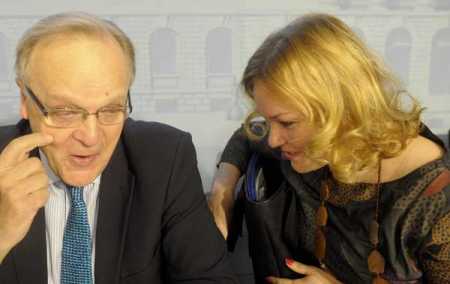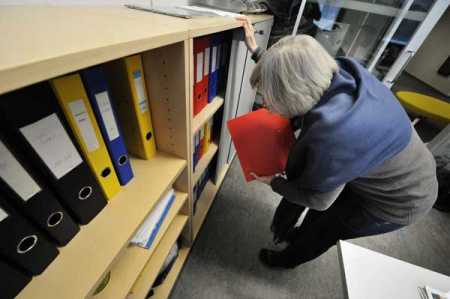Wed, 09 Oct, 2013 12:04:13 AM Youths rank best in the world Skill of adults also in top FTimes Report, October 9  A Man working with a computer. Photo – Lehtikuva. The competencies of Finnish people in different sectors are in excellent level, according to a report published by the Programme for the International Assessment of Adult Competencies (PIAAC 2012) on Monday.
The fact that young age groups ranked among the best in the world is an important signal to employers.
The report said that young people in Finland are competent labour force, and there is great potential for growth in Finland by tapping into competence-oriented business activities, said a press release.
The Education Minister, Krista Kiuru and Labour Minister Lauri Ihalainen expressed their satisfaction over the results saying that it reflect the strengths of the Finnish educational system.
“Overall Finland fares very well indeed and I am particularly happy about the first-rate competencies of young Finns in all areas of proficiency in the survey. But there is some cause for concern because the results show that education, and hence also competencies, is handed down from one generation to the next,’ observes Minister of Education and Science Krista Kiuru.
He said this could be seen that the participants’ educational background and that of their parents was strongly linked to competencies. “Those who have a weaker educational background are placed to strive from an unequal position. This also indicates that more work is needed to reach equality in adult education,” Kiuru added.

Education Minister Krista Kiuru and Labour Minister Lauri Ihalainen expressed satisfaction over the report on Tuesday. Photo – Lehtikuva. Minister of Labour Lauri Ihalainen said, besides good occupational skills, Finns are efficient in the processing and management of information and have good skills in learning and collaboration. “These are fundamental for securing lasting work careers in today’s fast-changing world, whether it’s about remaining in working life, moving to a new job or a new field of work altogether,” he said.
The results of the study help identify the strengths and weaknesses in Finnish society in an international context, so that it is possible to steer decision-making on the basis of research data.
A major cause for concern is how weak the competencies of the unemployed are relative to those who are employed. There is the risk that, if unemployment continues, the skills will further deteriorate because they are not being used.
About 40% of the jobless do not have basic occupational qualifications. The three-day right to education and the programme designed for improving young adults’ skills are actions the government has already taken to address the problem.
Basic skills of Finnish adults is the best in OECD countries
The Survey of Adult Skills (PIAAC 2012) shows that average literacy and numeracy skills among Finnish adults were also excellent. Finnish adults are also among the best in the survey in their ability to solve problems in technology-rich environments.
The survey assesses literacy and numeracy skills and the ability to solve problems in technology-rich environments among 16 to 65 year old in 24 countries.
There were, however, many whose skills were weak too. The good average scores of Finland are largely due to the good skills of 20 to 39 year olds. Skills among older age groups are at the OECD average level, the study revealed.
The average literacy skills of Finnish adults are excellent in relative terms internationally.
Their average literacy score was 288 points, which is well over the average score for the OECD countries (273 points). The only country that fared better was Japan.
Two thirds of the adult population in Finland are either good or excellent readers. On the other hand, 11% of all 16 to 65 year olds have very poor skills in literacy.
The average score in numeracy of Finnish adults is among the best in the survey
Finland’s average score (282 points) is clearly over the average score for the OECD countries (269 points). Japan was the only country that exceeded Finland in proficiency in numeracy.

Senior employee in the office in Helsinki.Photo – Lehtikuva. Over a half of all adult Finns (57%) have either good or excellent skills in numeracy, but at the same time, 13% of the adult population experiences great difficulties with basic mathematics.
Altogether 41% of all Finns have either good or excellent ability to solve problems in technology-rich environments. This is well over the OECD average (34%). The only country to exceed Finland in this area is Sweden, according to the survey results.
The international survey is the largest ever study organised by the OECD on the level and use of basic skills of the adult population, and it is expected to provide a significant source of information for developing education and working life.
Some of the participants in the survey did not want to or were not able to use the computer to complete the tasks.
The respondents account for an average of 24% in the OECD countries and about 19% in Finland.
Around 30% of the Finnish adult population aged 16-65 years, in other words about a million adults, have insufficient skills in solving problems in technology-rich environments, when adding up those who did poorly in the section on the ability of solve problems in technology-rich environments and those who did not do the tasks by computer at all.
Significant differences between age groups
The good average scores of Finland are largely thanks to the good skills of 20 to 39 year olds.
Those aged 30 to 34 years were the best in both literacy and numeracy, whereas those aged 25 to 29 had the best ability to solve problems in technology-rich environments.
The youngest age group, those aged 16 to 19 years, did not score as high in each of the areas of proficiency as those aged 20 to 24.
Finnish people aged 20 to 34 years were, together with their Japanese counterparts, the best in both literacy and numeracy. In the ability to solve problems in technology-rich environments, this age group shared first place with the Swedes.
The skills of older age groups were generally weaker than those of younger ones in the survey, but the differences between age groups varied considerably by country.
There are large differences between age groups in Finland. In Finland, the gap between the oldest age groups to the best performing age groups in literacy and problem-solving in technology-rich environments is the widest in the survey, and second widest in numeracy too.
There were no major differences in literacy between men and women in Finland, not even among those aged between 19 and 29 years. Men are slightly better than women in numeracy.
There were no significant differences between men and women in the ability to solve problems in technology-rich environments. These differences between the genders are close the OECD average.
The qualifications of employees and the self-reported qualifications required for their work was appropriate in 69% of the cases.
This is a slightly higher figure than for the OECD countries of average (66%). Proficiency acquired through education was under-used among 17% of the participants, which is slightly less than the OECD average (21%).
Altogether 14% of the Finnish participants had lower qualifications than their self-reported job requirement. This is close to the same figure as for the OECD countries on average (13%). The highest qualification deficit is in Italy (22%) and Sweden (21%).
In Finland, literacy and numeracy meets job requirements better than formal education. Less than 5% of employees had shortages in these skills in terms of their job requirements. About 7% were not using their full potential in skills at work, said the survey.
More News
|
|
Finland Times
| Wednesday, 28 January, 2026 |

